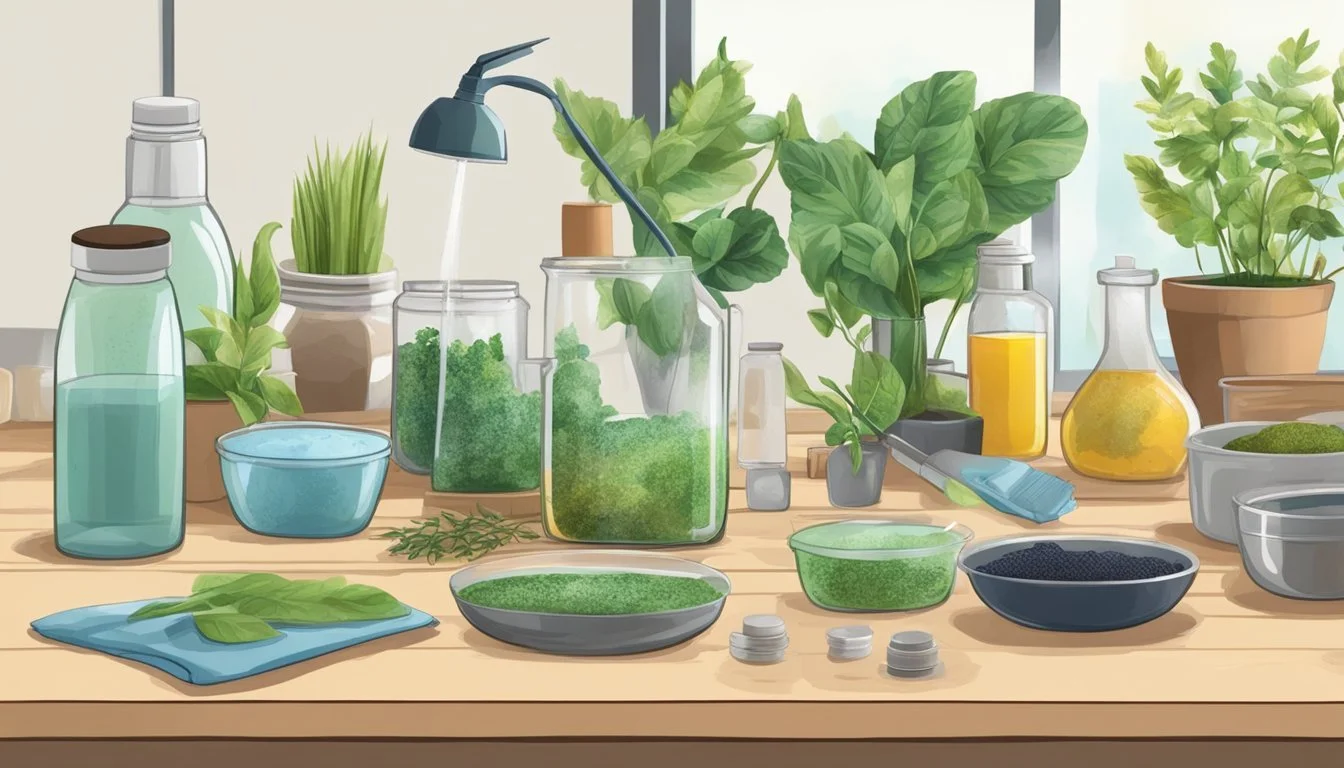Environmentally Friendly DIY Herbicides
Safe Solutions for Weed Control
In recent years, there has been a significant shift towards environmentally friendly practices in various aspects of everyday life, including gardening and lawn care. With a growing awareness of the potential harm that chemical weed killers can impose on the environment, the interest in organic weed control has surged. Gardeners and homeowners alike are seeking natural alternatives that are effective without a negative impact on the earth.
Organic weed control encompasses a range of methods that do not rely on synthetic chemicals to manage unwanted vegetation. Instead, these natural weed killers often use household ingredients that are regarded as safer. DIY versions can be concocted using common ingredients that are typically found in a pantry. These solutions provide a promising avenue for those prioritizing sustainability while still requiring practical ways to maintain their landscapes.
Embracing natural effective weed-killer alternatives not only contributes to a healthier ecosystem but can also offer cost-effectiveness and a sense of personal accomplishment. Creating homemade organic weed killers aligns with the broader commitment to environmentally friendly practices, ensuring that efforts toward weed control are in harmony with ecological well-being and safety.
Understanding Weeds and Their Impact on Gardens
In managing gardens, it is crucial to recognize the diverse weed species and their effects on the surrounding flora and the soil's health.
Types of Weeds
Weeds are categorized by their life cycles and leaf types. The primary groups are annual, perennial, and broadleaf weeds:
Annuals like crabgrass and chickweed germinate, grow, and propagate within a single growing season. They spread rapidly and compete with garden varieties for resources.
Perennials, such as dandelions and velvetleaf, can live for multiple years. The deep root systems of perennial broadleaf weeds make them challenging to eradicate. Perrenial broadleaf weeds are distinguished by their wide leaves and include species like dandelions, which disrupt the uniformity and aesthetics of lawns and gardens.
Effects of Weeds on Gardens and Soil
Competition: Weeds fiercely compete with other garden vegetation for sunlight, nutrients, and water. This battle can stunt plant growth and yield.
Soil Health: Some perennial weeds can profoundly change soil structure and composition. They may deplete soil nutrients and moisture, leaving less for desired plants.
Understanding these aspects aids in developing effective and eco-friendly weed management strategies that preserve garden vitality and soil quality.
Chemical Weed Killer Concerns
Chemical herbicides, such as glyphosate-based products like Roundup, pose significant concerns due to their potential harm to human health, negative impacts on wildlife and ecosystems, and risk of soil and water contamination, organic weed killers are a safer alternative.
Weed Killer Risks on Human Health
Chemicals in herbicides can have serious implications for human health. Glyphosate, a widespread herbicide, has been at the center of controversy due to its association with cancer. Exposure to harmful chemicals in herbicides can occur through direct contact or consumption of contaminated food and water full of weed-killer residues, raising significant health concerns for humans.
These toxic chemicals found in manufactured products can leach into the groundwater and cause problems on the land on a large scale, spreading across the countryside.
Effects on Wildlife and Ecosystems
Herbicides are not selective in their toxicity. Birds, insects, and non-target plant species can all be adversely affected by strong chemicals meant to eliminate stubborn weeds like poison ivy and dandelions because they are non-selective.
This also means that they are not child or pet-friendly as you might imagine a cause for concern for families, those with pets, and those with roaming livestock.
These substances can alter the habitats and food sources of wildlife, leading to disrupted ecosystems and decreased biodiversity.
Soil and Water Contamination
The environmental impact of chemical herbicides extends to the soil and water systems they come in contact with. Toxic chemicals from herbicides can leach into the soil, affecting its health and fertility and contributing to soil erosion by disrupting the soil constitution.
Additionally, water contamination is a critical issue, as herbicides can run off into bodies of water, posing threats to aquatic life and contaminating drinking water sources. The answer then, is to look toward organic weed control.
Safety Measures When Creating Organic Weed Killer
Finding an organic certified herbicide on the market is tricky because of complicated labeling systems, it can also be very expensive.
Creating DIY organic herbicides can be a cheaper, more effective, and environmentally friendly way of controlling weeds. Safety and preparation of the weed killer are key to ensuring the process is both efficient and harmless to the user and wildlife.
To prepare and apply the homemade organic weed killer, certain equipment is required to ensure effective application. The necessary tools include:
Spray bottle: For targeted weed killer application, a clean, labeled spray bottle is essential. This facilitates the direct spraying of the weeds while minimizing overspray.
Mixing container: A bucket or large bowl is needed for combining the herbicide constituents.
Straw or stick: For stirring the mixture thoroughly, a long stick or a straw is recommended to ensure uniform distribution of ingredients within the solution.
Simple DIY Eco-Friendly Herbicide Recipes
Creating your own environmentally friendly organic weed killer is a straightforward process involving common household items such as vinegar, salt, and organic herbicidal soap. These ingredients when used properly, can effectively manage weeds without the need for commercial chemical killers.
Salt-Based Weed Killer
Sodium chloride, can be used to desiccate and kill weeds.
Simple Salty Herbicide:
1 cup table salt
2 cups boiled water
Mix and dissolve in boiling water. Apply directly to the weeds but remember they can kill grass.
Vinegar Mixtures
Vinegar, particularly white vinegar, contains acetic acid which draws moisture out of weeds, causing them to die. White vinegar usually contains around 5% acetic acid, making it a potent organic weed killer.
Basic Vinegar Herb1-gallon gallon white vinegar
Use as is by pouring it directly on the weeds, preferably on a sunny day for best results.
Soap Additives
Liquid soap can be added to mixtures to act as a surfactant, which helps the solution stick to the leaves and stems of weeds for improved efficacy. Howeer it is important to check the ingredients regular dish soap could also harour harsh chemicals.
Vinegar and Soap Herbicide:
4 cups white vinegar
1/4 cup sodium
1 teaspoon liquid soap
Combine all ingredients in a spray bottle and thoroughly coat the weeds.
Acidic Organic Weed Killers
Acetic acid, found in household vinegar, is an acidic option for organic weed control when used in higher concentrations. For a potent herbicide:
Vinegar Solution:
1 gallon of vinegar
1 cup of sodium chloride
1 tablespoon of liquid soap
Mix ingredients, ensuring the contents dissolve thoroughly. Apply during peak sunlight hours to ensure maximum efficacy of these non selective organic herbicides.
Citric Acid (how long does citric acid last?) Mixture:
2 cups of lemon juice
1 gallon of water
1 teaspoon of oil (optional for enhanced potency)
Citric acid acts as a desiccant, drawing moisture from unwanted weeds upon contact.
Alcohol-Based Organic Weed Killer Mixtures
Alcohol alters the water balance in plant cells, which can lead to dehydration and death of weeds alcohol could be a good solution for stronger weeds such as poison ivy:
Vodka Weed Killer:
1 ounce of vodka (ethanol)
2 cups of water
A few drops of liquid soap
Mix and spray the alcoholic weed killer on the leaves in full sunlight to help penetration and drying.
Oil Infused Organic Weed Killer
Oils can act as natural post-emergent herbicides by suffocating the weeds:
Essential Oil Blend:
10-15 drops of clove oil
1 quart of water
A squirt of eco-friendly, organic herbicidal soap
Clove oil, containing eugenol, is a natural herbicide. The soap acts as a surfactant enhancing oil distribution over the leaves.
Cooking Oil Spray:
1/2 cup of any cooking oil
1 gallon of vinegar
1 tablespoon of lemon juice
Cooking oils can coat the leaves, disrupting the plant's cellular function. The addition of vinegar and lemon juice amplifies the herbicidal effect.
Other Organic Alternatives to Traditional Weed Killer
Moving away from traditional chemical weed killer, gardeners increasingly leverage organic solutions for effective weed control. These alternatives include natural, plant-based killers, physical barriers, and techniques promoting soil health, all aligning with ecological principles. Working on a weed prevention angle as well as a killing weeds ensure the best weed control.
Organic Use of Corn Gluten Meal for Weed Control
Corn gluten meal emerges as a natural pre-emergent herbicide, effectively inhibiting seed germination. Gardeners should apply corn gluten meal at a rate of 20 pounds per 1,000 square feet to achieve optimal weed control. However, timing is crucial; it should be spread in early spring before weed seeds begin to sprout.
Mulch Barrier Techniques
Mulch serves as a dual-purpose ally in organic weed control, both suppressing perennial weeds and enriching soil health. Mulch beds limit sunlight, essential for weed growth, and can be derived from a variety of organic materials:
Newspaper: Layers of newspaper, ideally 4-6 sheets thick, become a biodegradable barrier that smothers weeds and retains soil moisture. For added effectiveness, it should be topped with another form of mulch, such as compost and grass.
Cardboard: A single layer of cardboard acts as a sturdy, decomposable weed suppressant. It is best used in larger areas and covered with organic mulch or compost to improve aesthetics and soil conditioning.
Utilizing these weed control methods not only impedes unwanted plant growth but also contributes to a cycle of organic matter replenishment, benefiting the soil ecosystem.
Gardeners should avoid salt-based solutions, as they can harm soil structure and beneficial organisms. Instead, consistent mulching with organic materials serves as an appropriate weed deterrent while fostering a healthy garden environment.
Application Techniques for Eco-Friendly Organic Weed Control
When applying eco-friendly weed controllers, precision and method are vital to maximize efficiency and minimize harm to surrounding plantlife. Different organic weed control techniques are suited for specific situations, whether treating individual weeds or addressing larger areas.
For precise application, sprayers and spray bottles are recommended. Gardeners should:
Use a sprayer with an adjustable nozzle to target weeds directly, avoiding overspray.
Opt for a simple spray bottle for spot-treating smaller areas or fewer weeds, ensuring a concentrated application only on the unwanted vegetation.
A method involving no chemicals is to pour boiling water directly onto the weed, which kills weeds quickly without affecting the nearby plants if done very carefully.
When dealing with larger areas of weed infestation, techniques include:
A pump sprayer for even distribution of a homemade eco-friendly solution across a wider zone.
Setting the sprayer on a broader mist to cover more ground quickly while still controlling the direction to prevent overspray.
Eco-friendly weed control options minimize environmental impact, but they require considered application techniques to be effective and safeguard desired plants and soil health.
Preventative Strategies for Weed Management
Preventative measures are key in managing weeds effectively in a non-toxic manner, focusing on both physical barriers and the promotion of healthy garden growth to suppress unwanted plants before they become a problem.
Landscape fabric acts as a physical barrier beneath the soil surface. When used in flower beds or vegetables, it can:
Block weed growth: Properly installed landscape fabric impedes weeds from reaching sunlight, thus hindering their growth.
Retain moisture: The fabric maintains soil moisture levels, which benefits the whole outdoor space while preventing weeds that thrive in drier conditions.
Tips for Maintaining Organic Weed Control
Maintaining a weed-free space hinges on proactive and environmentally responsible practices. By integrating regular weed management and considering environmental impact, gardeners can effectively control unwanted growth without harming the surrounding ecosystem.
Looking after grass can be an efficient weed control method, it is important to remember that some store bought weed killers can also be a potential grass killer chock-full of harmful chemicals.
Consistent Hand Weeding: A key method to eliminate unwanted weeds is by weeding by hand it is the best way to ensure selevtive weeding. Gardeners should wear gloves to protect their hands and pull out weeds from their roots to reduce the chance of regrowth. It's best to tackle weeding after rain when the soil is moist and roots come out more easily.
Schedule routine weeding sessions
the Ensure removal of the entire root system
Herbicides and Ecosystem: When opting for herbicides, choosing natural or homemade options helps protect the land. Solutions made from ingredients like vinegar can act as non-toxic herbicides, but they should be used judiciously to avoid affecting the surrounding vegetation.
Select products safe for nearby flora and fauna
Apply spot treatments to the minimize the impact
Lawn Care and Weeds: Maintaining a healthy lawn with regular mowing and fertilizing can naturally reduce weed occurrence. Dense grass growth creates dense root systems and prevents weeds from establishing and spreading.
Set more high-cutting cutting setting to promote grass thickness
Use organic fertilizers to nourish the lawn without chemical runoff
Invest in organic lawn food or make your own
By incorporating these regular weeding practices and environmental considerations, gardeners can sustain a thriving environment that coexists harmoniously with natural ecosystems.
Impact on Lawns and Flower Beds
In assessing the viability and consequences of using DIY herbicide solutions, it's essential to examine both their short-term effectiveness and long-term impact on various plant types and overall vegetation health.
Lawns and flower beds require selective weed management approaches. DIY herbicides are non-toxic but often non-selective, which means they may not differentiate between weeds like broadleaf, moss, and ground ivy, lawns and flowers.
Perrenial Broadleaf Weeds: Some natural homemade mixtures like vinegar or sodium-based solutions can effectively dry out most broadleaf weeds but may also harm nearby grass speading via root systems if not carefully applied.
Moss: DIY remedies that alter soil pH, like baking soda (how long does baking soda last?) to raise pH, can create unfavorable conditions for moss, which typically prefers acidic environments.
The beneficial organisms and the soil structure beneath grasses and flower beds could potentially be disrupted by the continuous use of certain homemade products. For instance, salty herbicides might accumulate in the soil over time, leading to soil degradation and a decrease in fertility.
Soil Health: Ingredients such as vinegar are biodegradable and considered less harmful in moderation, but excessive use can alter the soil's pH balance.
Microbial Life: Beneficial bacteria and fungi play a crucial role in nutrient cycling and plant growth. Non-targeted applications could harm these organisms, indirectly affecting plant health and growth.
By understanding the specific needs of cultivated grass and flower beds, one can tailor DIY herbicide use to protect desirable plants while targeting unwanted growth.
Benefits of Using Natural Organic Weed Killers
The shift toward a natural weed killer offers many significant health and environmental advantages and is vital in supporting ecological diversity.
Reduction of Toxic Exposure
Minimizing Health Risks: The use of homemade mixtures devoid of toxic substances can decrease the risk of exposure to potentially harsh chemicals. Research indicates that some synthetic herbicidal products have been linked to health issues including cancer. By adopting natural solutions, gardeners and homeowners can mitigate these health risks.
Protecting Sensitive Groups: Children and pets are especially vulnerable to the effects of chemical weed killers. Child and pet-friendly natural ingredients reduce the likelihood of their exposure to substances that might affect their health.
Garden Safety: For those maintaining a vegetable patch, natural weed killers ensure that veggies are not tainted with harmful residues, preserving their safety for consumption.
Supporting Wildlife: Eco-friendly selective weed control methods are less likely to harm non-target plants and insects. By avoiding toxic weed killers, gardens become a safer habitat for birds and beneficial insects.
Healthy Soil Ecosystem: Environmentally safe techniques avoid contamination and degradation of soil quality. A robust soil ecosystem is central to plant health and biodiversity.
Conserving Plant Diversity: Reducing the use of broad-spectrum weed killers, which can inadvertently damage things nearby, natural organic weed killer helps in maintaining plant diversity in an ecosystem.
Challenges and Limitations of DIY Herbicide Use
While DIY herbicides offer an eco-friendly alternative to chemical herbicides, users face several challenges and limitations regarding their effectiveness and application process.
Effectiveness Compared to Chemical Options
Efficacy: DIY herbicides may not be as effective as chemical options like glyphosate, which can systematically kill weeds.
Heat treatments such as hot water are fast-acting but may not prevent regrowth.
Weed Type: Effectiveness varies significantly depending on the weed.
Broadleaf weeds: DIY solutions can be effective.
Creeping Charlie and Nutsedge: These are resilient and may require multiple treatments.
Persistence: Natural herbicides generally do not offer long-term control compared to commercial chemicals.
Preparation and Application Considerations
Consistency: Homemade mixtures can vary in concentration, impacting their performance.
Regular re-application may be necessary, increasing labor and time input.
Safety: While generally safer, care must still be taken with substances like boiling hot water to avoid harm.
Precision: Application requires care to avoid damage to other vegetation, as they are a non-selective form of weed control.









